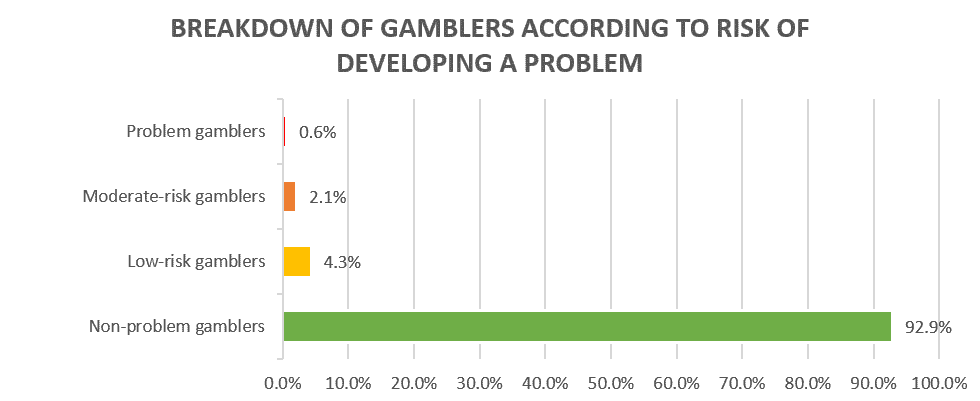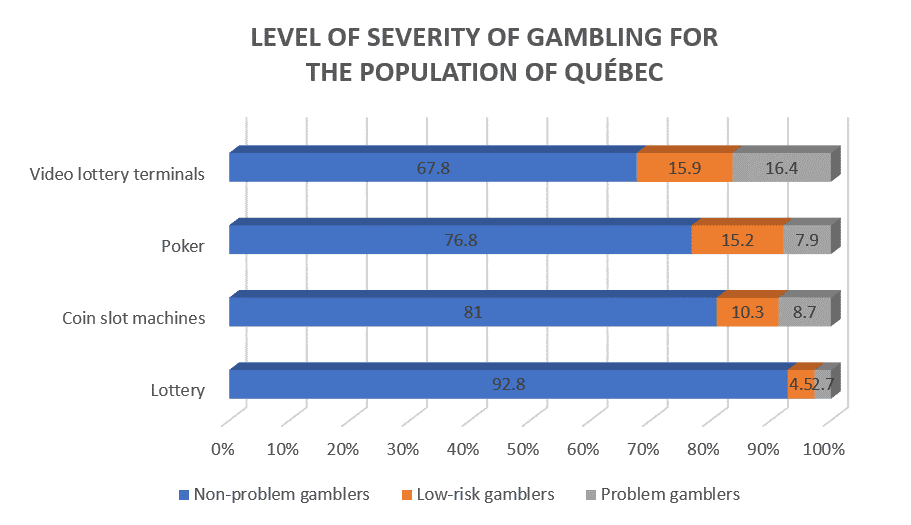[TESTIMONY] “For the first time, I felt that I was speaking with someone who understood.”
...
Read moreWhat are the habits of Québécois regarding gambling? The last significant study on 12 008 Québécois was done in 2012 by the Research Chair on Gambling Studies . Here are some highlights:

In summary, gambling is not problematic for the majority of the population. In fact, a lot of people gamble for fun without losing control. However, for thousands of Québécois, gambling is no longer recreational and could lead to excess and addiction.
According to the same study in 2012 by Kairouz and Nadeau, the most popular games of money and chance in Québec were lotteries (91 % of gamblers), slot machines (14, 6 % of gamblers), poker (7 % of gamblers), Bingo (6, 3 % of gamblers) and VLTs (video lottery terminals) (6, 2 % of gamblers). Thus, these games do not all hold the same risk for developing a gambling problem.

We found that certain games such as video lottery terminals (VLT) are more prone to cause an addiction. More than 32% of gamblers are considered problematic or at low risk whereas, for lotteries it is only 7, 2%. We must bear in mind, however, that a lot more people play the lottery (91% of gamblers) than they do VLTs (6, 2% of gamblers).
Moderate risk and excessive gamblers account for a major part of the total gambling expenses in Québec. In fact, we estimate that these gamblers represent 31, 6 % of the total of expenses. Problematic gamblers can sink huge amounts of money into gambling. In the case of excessive gamblers, an average of 23 928 $ is lost yearly in different types of games.
Average annual expenses for problematic and non-problematic gamblers
Non-Problem gamblers : 492 $
Moderate-risk gamblers : 3 653 $
Problem gamblers : 23 928 $
Ratio Problem gamblers/ Non-Problem gamblers : 48,6 fois +
A gambling addiction leads to serious consequences and can have negative repercussions not only on the gambler, but on close to 10 to 17 people of his/her immediate circle as well.
If you have regularly played one or another of these games in the last weeks or months, you may need to pay close attention to your behaviours. You may be at risk.
Even if video lottery terminals are the games of money and chance that more frequently become a problem for gamblers, keep in mind that all games of money and chance carry risk.
Kairouz, S., Nadeau, L. (2014). Portrait of gambling in Québec: Prevalence, incidence and trajectories over four years (report no 2009 — EP-130876). Montréal, Québec: Concordia University.
According to the study by Kairouz and Nadeau, about 0, 4% of the total adult population would be probable pathological gamblers and about 1, 4% would be moderate risk gamblers. According to the institut de la statistique du Québec, the adult population of Québec in 2019 was 6 900 109: .
Research Chair on Gambling studies, Les appareils électroniques de jeu au Québec, Booklet 7, April 2018.
Research Chair on Gambling studies, Les dépenses de jeu et leur concentration chez les joueurs excessifs, Fall 2019.